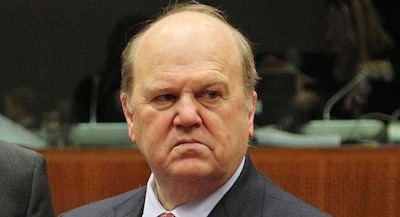
The 26 County Minister for Finance Michael Noonan blew over nine billion euro of government funds when he failed to stand up to EU bank chiefs over the state’s bank debts, the banking inquiry has revealed.
The marathon investigation found the Central Bank and Financial Regulator gave the country’s six main banks a clean bill of health before they collapsed in September 2008, an economic disaster which directly cost citizens more than 30 billion euro.
The parliamentary banking inquiry found the European Central Bank put the Fianna Fail-led coalition under undue pressure to accept tens of billions in bailout loans, but it also blocked burden sharing among international money lenders.
The inquiry repeated evidence that Jean Claude Trichet, the ECB chief in March 2011, told Finance Minister Michael Noonan that a “bomb would go off in Dublin” if senior bondholders -- the first in line to have loans repaid -- did not get their investments back.
It was the second time the ECB warned Ireland not to pass banks’ losses on to their paymasters, the inquiry found, with a November 2010 letter from Mr Trichet carrying a threat to switch off billions in emergency cash which was keeping the Irish banks alive.
Despite Noonan denying there had been any such threat, the inquiry said it was an “explicit threat” and that the ECB interventions were “critical”.
“These were all actions for which the Irish people ultimately paid and are still paying a heavy price,” the parliamentary inquiry found.
The committee accused the ECB of undermining its work by refusing to allow Mr Trichet to give evidence to the inquiry and it said there is a serious democratic deficit when it comes to the bank’s accountability.
After 18 months of work and 413 hours of hearings, the cross-party report found:
* A culture of excessive executive pay and bonuses for bankers.
* No one single event or decision led to banking collapse - it was the cumulation of events and decisions over a number of years.
* Property or land valuations were not routinely carried out as the boom heightened, even for some large developments, and desktop and drive-by valuations were used without agents seeing inside the home.
There was almost universal acceptance until 2008 that the property bubble would end with a “soft landing”, which the inquiry called a “fatally-flawed” theory that was never substantially tested or challenged by government, the Central Bank or the Department of Finance.
The inquiry said the infamous September 2008 “night of the guarantee” was a “myth”.
The idea to protect the six main banks in a 440 billion euro blanket security was tabled as early as January that year, the inquiry found, and ultimately the “decision-makers” on the night based their plan on inaccurate information about the health of the banks.
The lack of an independent, in-depth, deep-dive investigation into the state of the banks before that night was also criticised.
The committee published its report after Sinn Fein’s Pearse Doherty and Socialist Party TD Joe Higgins refused to give their support to the findings and recommendations.
Mr Higgins said banks had undue influence over government and while he praised the public hearings he said the inquiry ultimately failed to get to “the root cause and source of the infection”.
Mr Doherty said: “While the banking report touches upon of the relationship between bankers, developers and politicians, what it fails to do is examine those relationships. This is another fundamental failure of the report.”
Sinn Féin leader Gerry Adams said the party’s consistent position of imposing losses on senior bondholders following the banking collapse was borne out in evidence to the Banking Inquiry.
“The position taken by the NTMA mirrors what Sinn Féin called for at the time, but Fine Gael and Labour rubbished our proposals, calling us ‘economic illiterates’,” he said.
“It’s clear now who the economic illiterates are. The policies of Fine Gael and Labour were wrong in 2011 and they are wrong now.
“Unlike Fine Gael, Labour and Fianna Fáil, Sinn Féin in Government will always put the interests of citizens and families before those of banks and speculators.”
![[Irish Republican News]](https://republican-news.org/graphics/title_gifs/rn.gif)
![[Irish Republican News]](https://republican-news.org/graphics/title_gifs/harp.gif)

